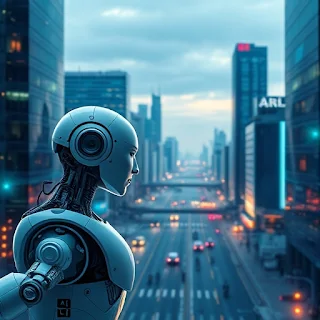The Future of Artificial Intelligence: What to Expect?
Artificial Intelligence (AI) has significantly transformed our lives in recent years. This leads us to wonder—what does the future of AI hold? Will it be a boon for humanity, or will it bring new challenges? In this blog, we’ll explore AI’s current impact, future potential, and the opportunities and risks associated with it.
The Current Impact of AI: Transforming Lives
AI has established itself in almost every field today. Let’s look at some key areas where AI has made a significant difference:
1. AI’s Contribution to Healthcare
AI has revolutionized healthcare by improving diagnosis and treatment. Tools like MRI and CT scan analyses have become more accurate with AI.
Example: During the COVID-19 pandemic, AI assisted in analyzing test reports and vaccine development.
Future: AI could enable personalized health plans for every individual.
2. The Future of Education
AI has made education more personalized and interactive.
Example: Platforms like Coursera and Khan Academy use AI to recommend tailored learning materials.
Future: AI will lead to the development of virtual teachers that adapt to students’ individual learning needs.
3. The Role of AI in Business and Industry
AI is transforming data analysis and marketing strategies.
Example: Companies like Amazon and Flipkart leverage AI to understand consumer behavior better.
Future: AI will streamline supply chains and boost productivity.
4. AI in Daily Life
AI has simplified everyday tasks.
Example: Voice assistants (like Siri and Alexa), smart home devices, and Google Maps rely on AI.
Future: Automation driven by AI will pave the way for smart cities.
What Can Change in the Future of AI?
1. Revolution in Healthcare
Under “what is the future of AI,” we anticipate groundbreaking changes in healthcare.
AI may predict diseases using genetic data and provide preventive care.
Real-time health monitoring devices will become commonplace.
2. The Era of Automation
Automation will dominate factories and offices in the future.
Robotics and machine learning will increase production efficiency while reducing costs.
Driverless cars and drone deliveries may become the norm.
3. Ethics and AI
The future of AI will also bring ethical and data security concerns.
Example: Without transparency in AI systems, people might hesitate to trust them.
Solution: Strict regulations and guidelines will be necessary for responsible AI usage.
4. Business and Employment
While AI might replace traditional jobs, it will also create new roles.
Roles such as data scientists, AI specialists, and robotics engineers will be in high demand.
Potential Risks of AI
To understand "what is the future of AI," we must also recognize its risks:
- Data Privacy Threats: AI could misuse personal user data.
- Cyber Attacks: AI-powered systems might be vulnerable to hacking.
- Misuse of AI: AI could be exploited to spread fake news and propaganda.
The Future of AI in USA
USA, as a developed country, holds immense potential for AI.
& Other developing countries Government initiatives like "Make in India" and "Digital India" are boosting AI adoption.
AI-powered services in healthcare and education are being prioritized.
Increased budget allocations for AI research and development show promise.
AI and Smart Cities
AI can improve traffic management and waste disposal systems.
It can also optimize energy consumption.
What is the Future of AI?
The answer to "what is the future of AI" lies in its ability to make our world smarter, more efficient, and progressive. However, ethical usage and accountability are crucial to ensuring its positive impact.
AI has the potential to benefit humanity, but its control must remain in our hands. By using AI responsibly, we can tackle future challenges and unlock endless possibilities.
Click here for more information about this
What’s Your Take?
Do you see the future of AI as a positive step for humanity? Share your thoughts with us in the comments!



Comments